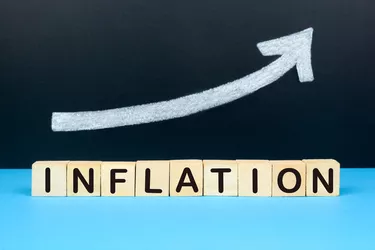The relationship between inflation and the value of money is at once straightforward and incomplete. The value of money can be considered the "buying power" of a unit of currency. Inflation is the overall concept that as time goes on, goods and services will cost more. Understanding inflation and how it impacts the value of money is essential to succeeding in your personal finance goals.
Basics of Inflation
Video of the Day
The principle behind inflation goes back to the central concepts of supply and demand, which drive all economies. Inflation can be caused by demand-pulling and cost-pushing. Congress has tasked the Federal Reserve with maintaining a relatively steady inflation rate of 2 percent each year through manipulation of interest rates.
Video of the Day
Writers for The Economic Policy Institute point out that none of this addresses the other half of monetary value, which is the availability of money to the consumer public. Steady inflation's intention to stimulate jobs and economic growth is predicated on an equivalent continued increase in consumers' income. However, wages have stagnated for decades in the U.S. and some other countries, resulting in declining spending power and growing economic disparity between workers and the wealthy elite.
The Value of Money
Money is essentially a medium of exchange, intended to equalize trade and remove inequality that might arise from a barter system. If everyone agrees that a dollar represents a certain amount of value, that value can be exchanged for goods and services. How great that value is depends on many factors.
Still, inflation is the practice of decreasing each dollar's buying power, assuming that goods and services will become more accessible and more abundant as time, technology and efficiency all progress. Because things should theoretically be easier to acquire, they should cost less to make and distribute and therefore cost less to buy. This means that if wages remain steady, a person will need to work less to continue purchasing the same goods and services.
Inflating prices over time ensures that people will need to continue to work roughly the same amount of time at the same job to afford the same objects. It's a strategy to encourage active spending instead of saving finances, overall stimulating the economy.
Money Loses Value Over Time
However, this means that any money set aside in a savings or checking account that doesn't have an interest rate matching or exceeding the inflation rate will effectively lose value over time.
The website In2013Dollars uses the Federal Bureau of Labor Statistics' values to calculate that the amount of bread you could buy in 1968 for $20 would cost just over $156 in 2021. This means that if you saved that $20 in 1968 instead of spending it, you would only be able to buy a little over 1/10 as much product with it today as if you had spent the money right away.
Inflation vs. Wage Stagnation
The Brookings Institute states plainly that the stagnation in wage growth since 1986 has been the direct result of policy-making decisions rather than the natural development of the market. While the Federal Reserve has continued adjusting interest rates to maintain inflation at roughly 2 percent each year, Congress has actively chosen not to increase the minimum wage each year since, with the notable exception of 2009.
If the federal minimum wage increased to keep pace with inflation in 2021, it would be roughly $24 per hour, according to the Center for Economic Policy and Research, instead of $7.25. So while inflation does impact the value of money, it is only half of the equation, with the other half being wage growth.
Consider also: How to Convert Annual Inflation to Monthly Inflation
- Forbes: How Inflation Erodes The Value Of Your Money
- Federal Reserve Bank of Cleveland: Inflation Expectations
- Economic Policy Institute: Causes of Wage Stagnation
- In2013Dollars: White Bread Price
- Center for Economic Policy and Research: This is What Minimum Wage Would Be If It Kept Pace with Productivity
- Federal Reserve: FAQs
